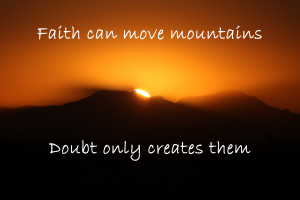Overcoming uncertainty and doubt
Faith “is the realization of what is hoped for and evidence of things not seen. By faith we understand that the universe was ordered by the word of God, so that what is visible came into being through the invisible.”[1] In writing to the Hebrews, Saint Paul describes faith as an innate ethereal longing for evidence and proof of the unknowable and the invisible as might be discovered through the refractory lens of the knowable and visible universe.

Moving Mountains
It is that insubstantial substance of faith which most often leads us to question, to wonder, and to equivocate. No mere mortal is immune to the vagaries of incertitude. Even the holiest and most revered of saints have been confronted with the congenital human tendencies toward uncertainty and doubt. One must proceed no further than the blessed apostles to discern instances of wavering faith, seldom displayed with such compelling honesty as when they said to Jesus, “Increase our faith.”[2]
We naturally question what we do not understand and we search for causality in the tangible. It is built within our DNA to ask those fundamental questions: “Why?“ and “Why not?” Questions of causality abound throughout all of human endeavor but are asked more so within science, philosophy, and religion. Some of the most basic of questions concerning causality can be found at the beginning of the first lesson of the 1885 Baltimore Catechism. “Who made the world?” “Who is God?” “What is man?” “Why did God make you?” We see the effect but worry about the cause; if we did not we would not be human.
We profess faith in God, yet lacking any understanding of Him we falter. Jesus tells us, “Everything is possible to one who has faith” and yet we cry out “I do believe, help my unbelief.”[3] We believe; we desire so much to believe, even as our faith is compounded by nagging uncertainties and doubts. How should we respond?
We first should recognize that within us are instilled certain innately conformed attributes that define precisely who we are and all that makes us human, and each of these attributes can be either positive or negative depending entirely on how we might express it. Our human character that calls faith into question offers a perfect example of this concept. One can question the existence of an unknowable, invisible, and eternal God from either a positive or negative perspective, yet it is the nature of the approach that is most essential. If one begins with a well-founded faith in the theological premise that God indeed exists and therefore seeks to validate that faith, through reasoned inquiry, then any expression of uncertainty or doubt is both appropriate and valid. If however, an inquiry is instigated based principally upon the conviction that God is either fiction or delusion then no manner of inquiry can be reasonably conducted or proof ascertained.
Perfect faith, like perfect love, is humanly impossible to attain yet Jesus tells us that “if you have faith the size of a mustard seed, you will say to this mountain, ‘Move from here to there,’ and it will move. Nothing will be impossible for you.”[4] A faith without question is a questionable faith, no question about it.
[1] Heb 11:1, 3.
[2] Lk 17:5.
[3] Mk 9:23-24.
[4] Mt 17:20.
